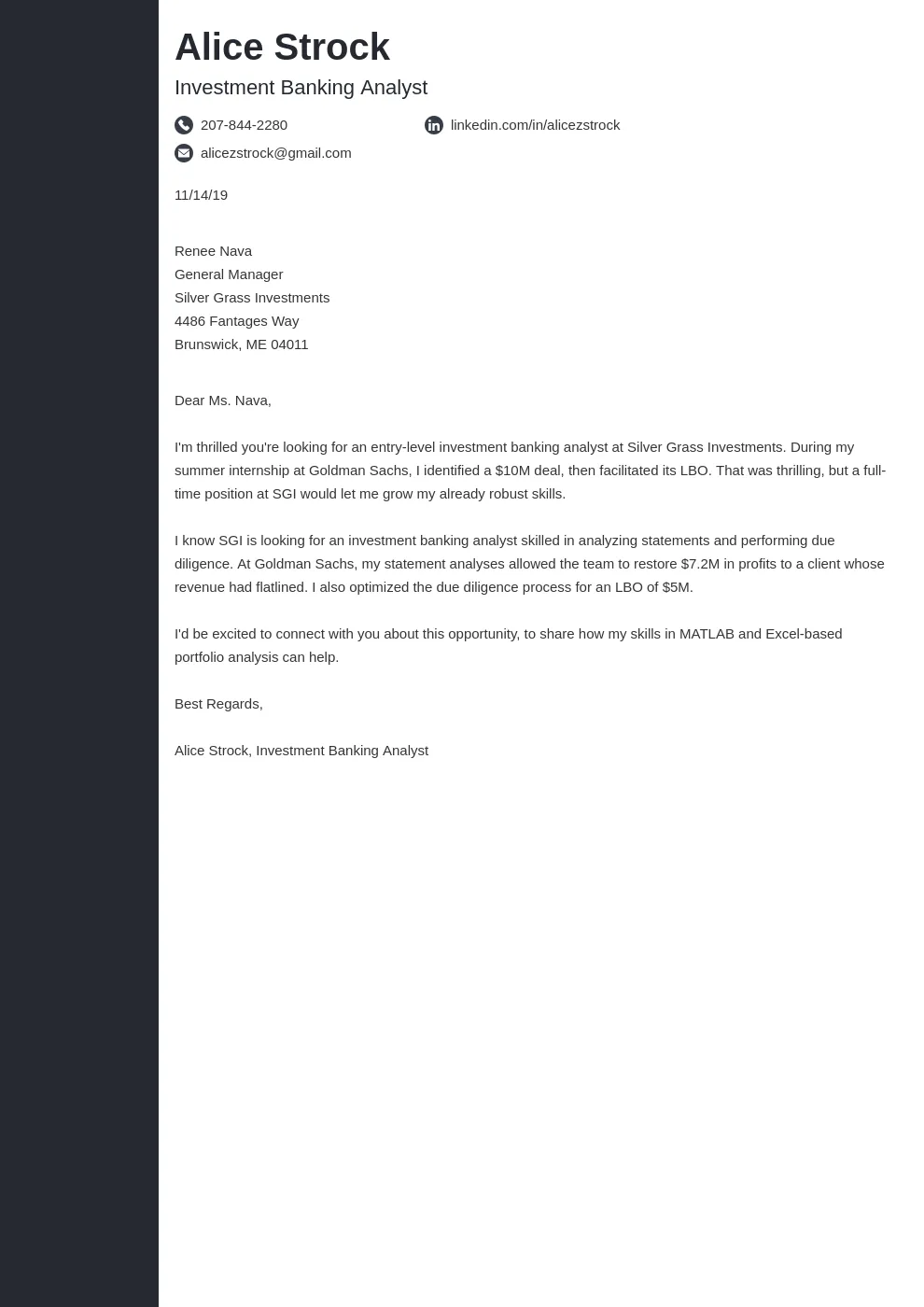Mastering Investment Banking Cover Letters
A well-crafted cover letter is your first and often most crucial step in the highly competitive world of investment banking. It’s not just a formality; it’s your initial opportunity to make a strong and lasting impression on potential employers. This guide provides you with essential tips and strategies to craft a cover letter that will not only make you stand out from the crowd but also effectively communicate your qualifications, passion, and suitability for the role. From understanding the fundamentals of a cover letter’s importance to avoiding common pitfalls, we will explore all you need to know to shine in the application process. Remember, your cover letter is more than just a document—it’s a powerful tool that can significantly enhance your chances of landing your dream job. Refer to image investment-banking-cover-letter-example.webp
Understanding the Importance of a Cover Letter
In an industry where hundreds of applications are often received for each position, a cover letter is a critical tool for differentiation. It offers you the opportunity to elaborate on your resume, demonstrate your genuine interest in investment banking, and explain why you are the perfect fit for the role. Recruiters and hiring managers use cover letters to assess your attention to detail, your written communication skills, and your understanding of the industry. A well-written cover letter can greatly increase your chances of getting an interview by highlighting your unique value proposition and showcasing your enthusiasm for the specific opportunity. Neglecting this step can be a significant missed opportunity. Refer to image cover-letter-importance-ib.webp
Highlighting Your Strengths
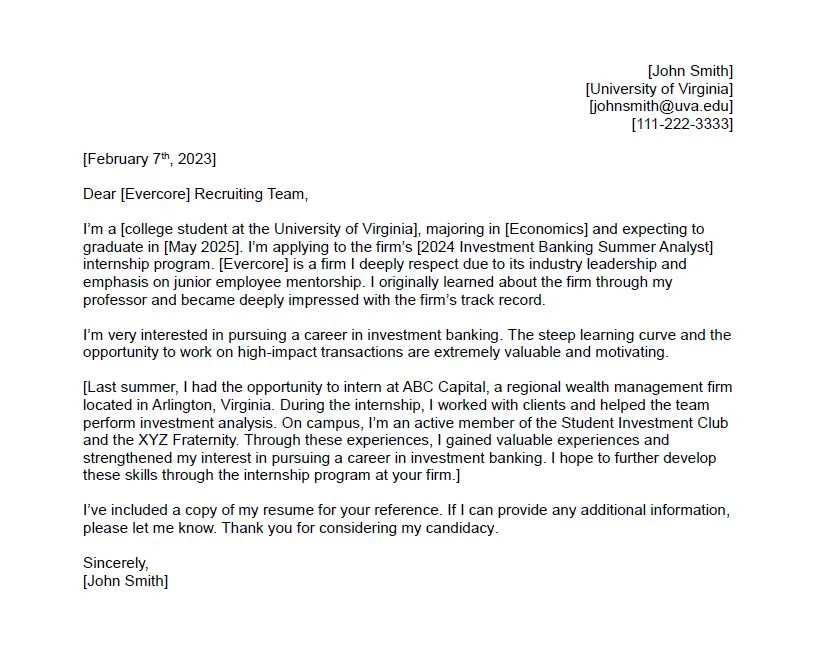
Your cover letter should spotlight your key strengths and how they align with the specific requirements of the investment banking role. Identify your technical skills, such as financial modeling, valuation, and accounting knowledge. Make sure to also highlight your soft skills like analytical thinking, problem-solving, communication, and teamwork abilities. Provide concrete examples of how you’ve demonstrated these strengths in past experiences. If you excelled in financial modeling, describe a project where you built a complex model or analyzed financial statements. If you’re a strong team player, describe how you contributed to a successful team project, highlighting your communication, collaboration, and leadership skills. Refer to image highlighting-strengths-ib.webp
Showcasing Relevant Skills
Investment banks are seeking candidates with specific skills essential for success. Highlight skills such as financial analysis, valuation, deal structuring, and market knowledge. Support your claims with tangible examples. Mention projects where you conducted financial analysis, built financial models, or valued companies. Demonstrate your understanding of financial statements, investment strategies, and market trends. Also, mention any experience with financial software or tools, such as Bloomberg Terminal or FactSet. Emphasize your experience in related fields, such as accounting, consulting, or corporate finance, where relevant. Refer to image showcasing-skills-ib.webp
Quantifying Achievements
Quantifying your achievements is a powerful way to make your cover letter stand out. Instead of stating that you improved efficiency, provide specific numbers to illustrate the impact of your work. For example, state, “Increased sales by 20% by implementing a new marketing strategy.” Quantifying achievements gives concrete evidence of your abilities and the value you can bring to the investment bank. Use metrics like percentages, dollar amounts, or other measurable figures to showcase the impact of your work. For example, you might state, “Led a team that closed three deals worth a combined $100 million.” This makes your accomplishments more impactful and memorable. Refer to image quantifying-achievements-ib.webp
Researching the Bank and Tailoring Your Letter
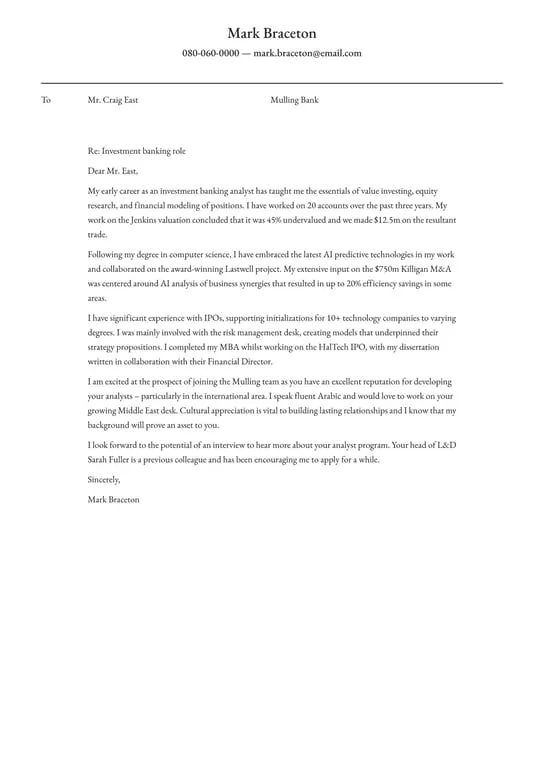
A generic cover letter will likely be discarded. Show you’ve thoroughly researched the bank and understand its values, culture, and recent deals. Mention specific aspects of the bank that appeal to you, and explain your interest. Refer to specific deals the bank has been involved in or mention any industry trends it is focusing on. This demonstrates your genuine interest and your knowledge. Tailor your letter to each specific role and firm. Use the job description as your guide and highlight the skills and experiences most relevant to the position. Address the hiring manager by name whenever possible, showing you’ve taken the time to personalize your application and show interest. Refer to image researching-banks-ib.webp
Demonstrating Your Interest and Passion
Investment banks are eager to hire candidates who are passionate about the industry. Show your enthusiasm by expressing your genuine interest in the specific role and the firm. Explain your excitement for the opportunity and what attracts you to investment banking. Discuss your career goals, your interest in the firm’s specific area of expertise, or your admiration for the firm’s culture. Share any relevant experiences, such as internships, projects, or coursework, that have strengthened your interest in the field. Be enthusiastic and sincere to convey your passion for the industry. Refer to image investment-banking-cover-letter-example.webp
Structuring Your Investment Banking Cover Letter
A well-structured cover letter is essential for keeping the reader engaged and making a positive impression. It should be logically organized, with clear sections that effectively highlight your key qualifications and experiences. Consider the following structure to organize your letter and present your information clearly, thus maximizing your impact. Refer to image cover-letter-structure-ib.webp
The Header and Contact Information
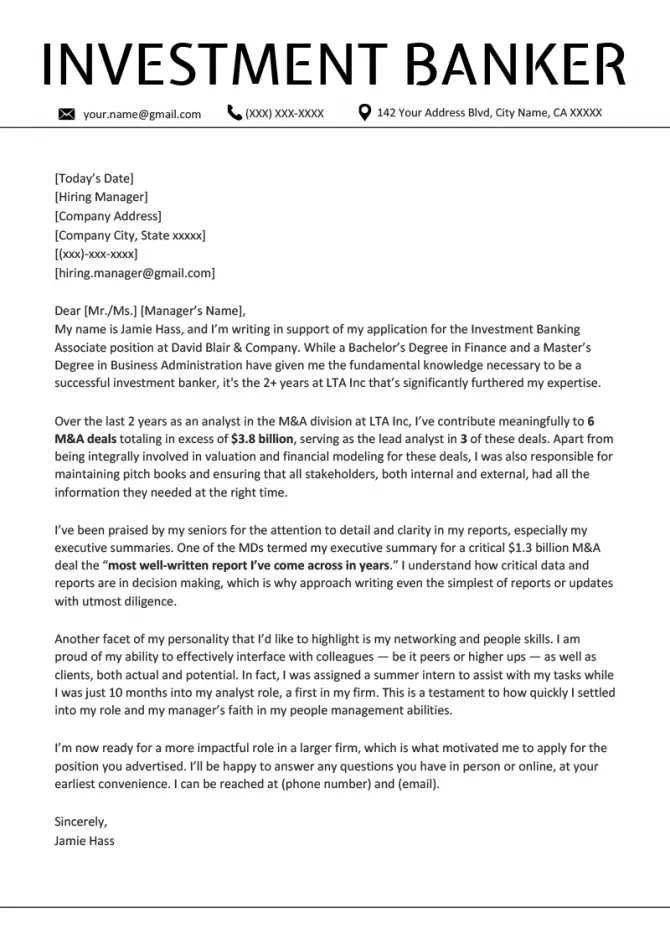
Start with a professional header that includes your contact information: your name, phone number, email address, and LinkedIn profile URL. Include the date and the hiring manager’s name, title, and the bank’s address. Make sure your contact information is accurate and up to date. The header sets the tone for the rest of the letter; it should look professional, reflecting your attention to detail.
The Opening Paragraph Hooking the Reader
The opening paragraph is your chance to immediately grab the reader’s attention. Start by clearly stating the position you are applying for and where you saw the advertisement. Immediately convey your enthusiasm for the opportunity and the firm. Mention a key skill or experience that makes you a great fit for the role. The opening should be concise, compelling, and show your genuine interest. Avoid generic openings like “I am writing to express my interest…” Instead, make your opening unique and engaging.
Body Paragraphs Showcasing Skills and Experience
The body paragraphs are where you showcase your skills, experiences, and accomplishments. Each paragraph should focus on a specific aspect of your qualifications and provide evidence to support your claims. Use the STAR method (Situation, Task, Action, Result) to structure your examples. Describe the situation, the task you undertook, the actions you took, and the results you achieved. Quantify your achievements whenever possible. While you should refer to your resume, use the cover letter to provide more context and detail. Show how your skills and experiences align with the requirements of the role and the bank’s values.
Highlighting Relevant Experiences
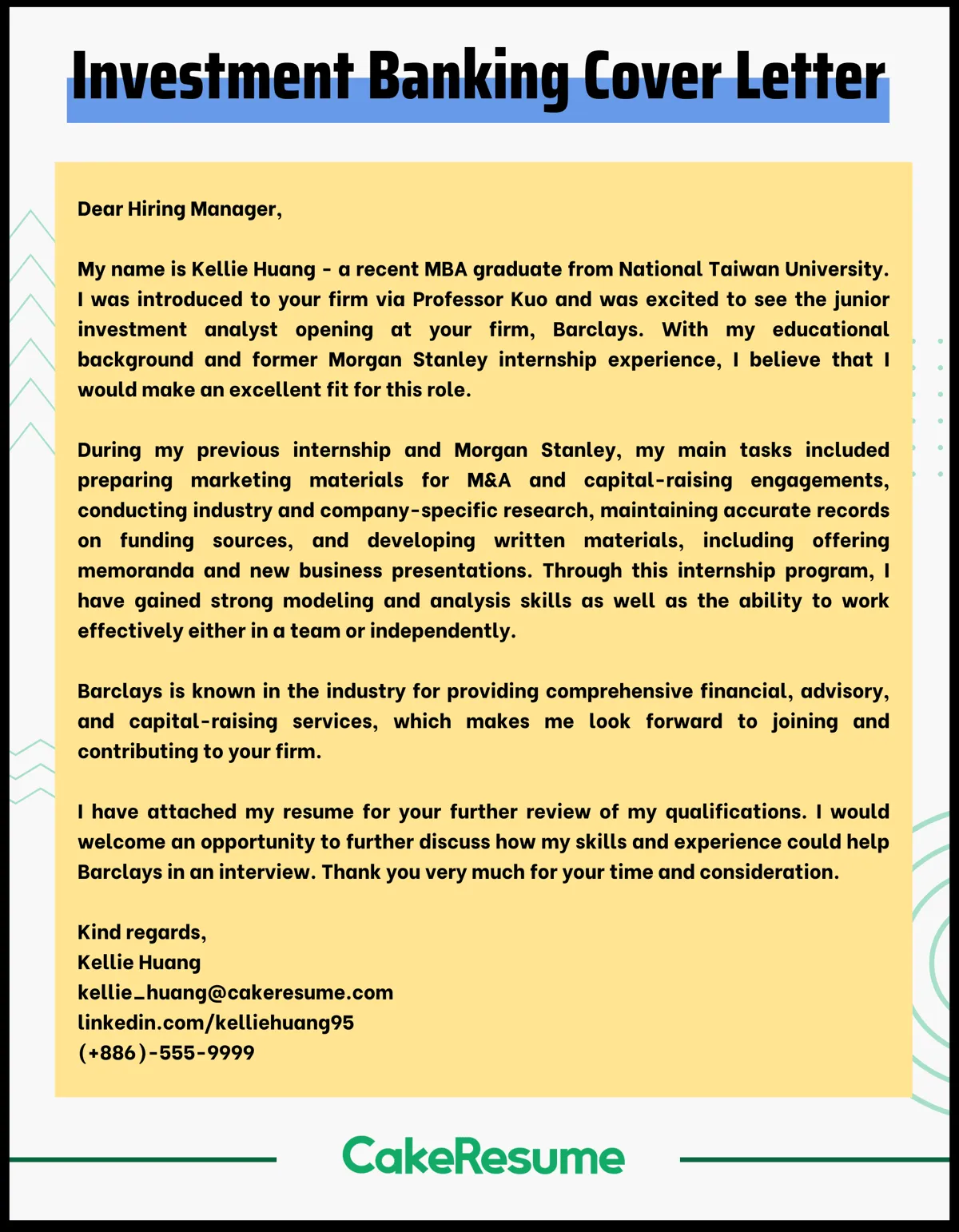
In the body paragraphs, focus on the experiences most relevant to the investment banking role. Highlight internships, projects, or coursework that demonstrate your skills in financial analysis, valuation, and deal structuring. Discuss your roles and responsibilities in detail, and the key achievements you made. Even if your experience isn’t directly in investment banking, emphasize transferable skills, such as analytical thinking, problem-solving, and communication. Showcase any leadership roles you have held or any significant contributions you made to a team or project.
Quantifying Your Achievements
Throughout the body paragraphs, use data and numbers to quantify your achievements. Instead of saying “Improved efficiency,” state, “Improved efficiency by 15%.” Use percentages, dollar amounts, and any other relevant metrics to demonstrate the impact of your work. For example, you could say, “Led a team that closed three deals worth a combined $100 million.” Quantifying your achievements makes them more concrete and memorable. The inclusion of measurable results will make your cover letter much more impactful. Refer to image quantifying-achievements-ib.webp
The Closing Paragraph and Call to Action
In the closing paragraph, reiterate your interest in the position and the firm. Thank the hiring manager for their time and consideration. Express your enthusiasm for the opportunity to discuss your qualifications in more detail. Include a clear call to action, such as “I am eager to learn more about this opportunity and discuss how my skills and experiences can contribute to your team.” Offer to provide any additional information that the hiring manager might need. Make sure your closing is confident and professional. Reiterate the value you bring to the table. Do not end with a passive statement; actively show your eagerness to progress to the next step.
Proofreading and Editing Your Cover Letter
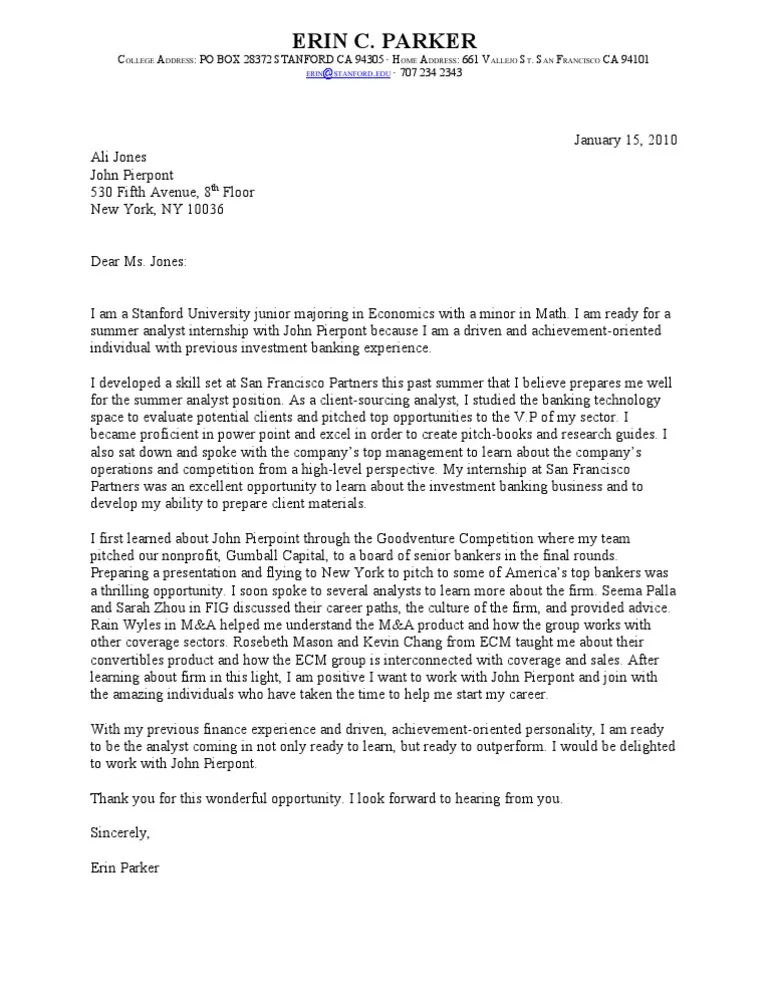
Before submitting your cover letter, proofread it meticulously for any errors. Check for typos, grammatical errors, and inconsistencies. Have someone else review your cover letter to catch any mistakes that you might have missed. A poorly written cover letter can damage your chances, no matter how strong your qualifications are. Proofreading is a crucial step in making your cover letter stand out. Take the time to revise and edit your letter for clarity, flow, and accuracy. Refer to image proofreading-editing-ib.webp
Common Mistakes to Avoid
Avoiding common mistakes is crucial to making a positive first impression. Here are some frequent pitfalls to avoid. Refer to image common-mistakes-ib.webp
Generic Language
Using generic language, such as “I am a hard worker” or “I have excellent communication skills,” does not effectively demonstrate your value. Instead, provide specific examples and quantify your achievements. Avoid clichés and use language that is unique and showcases your personality.
Typos and Grammatical Errors
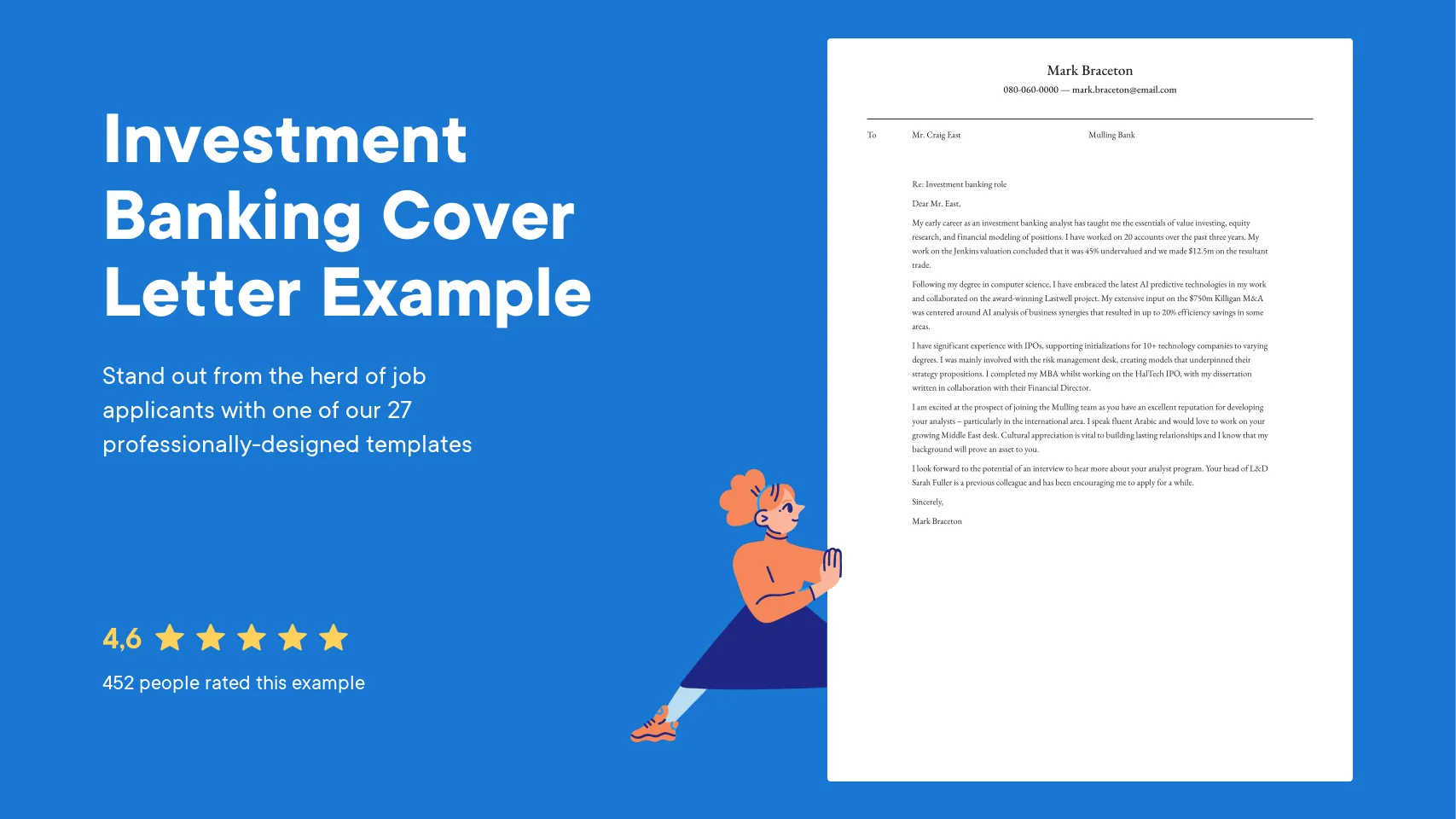
Typos and grammatical errors are the easiest way to lose credibility. Always proofread your cover letter carefully, and have someone else review it. Even a single mistake can give the impression that you lack attention to detail, which is absolutely essential in investment banking.
Ignoring the Specifics of the Role
Failing to tailor your cover letter to the specific role and firm demonstrates a lack of interest. Always research the role and the bank, and customize your letter accordingly. Highlighting relevant skills and experiences that align with the job description shows that you are a perfect fit.
Lack of Enthusiasm
Investment banks are looking for candidates who are genuinely passionate about finance and the industry. Avoid a tone that is too formal or impersonal. Show your enthusiasm for the opportunity and your eagerness to contribute to the firm’s success.
Seeking Feedback and Refining Your Letter
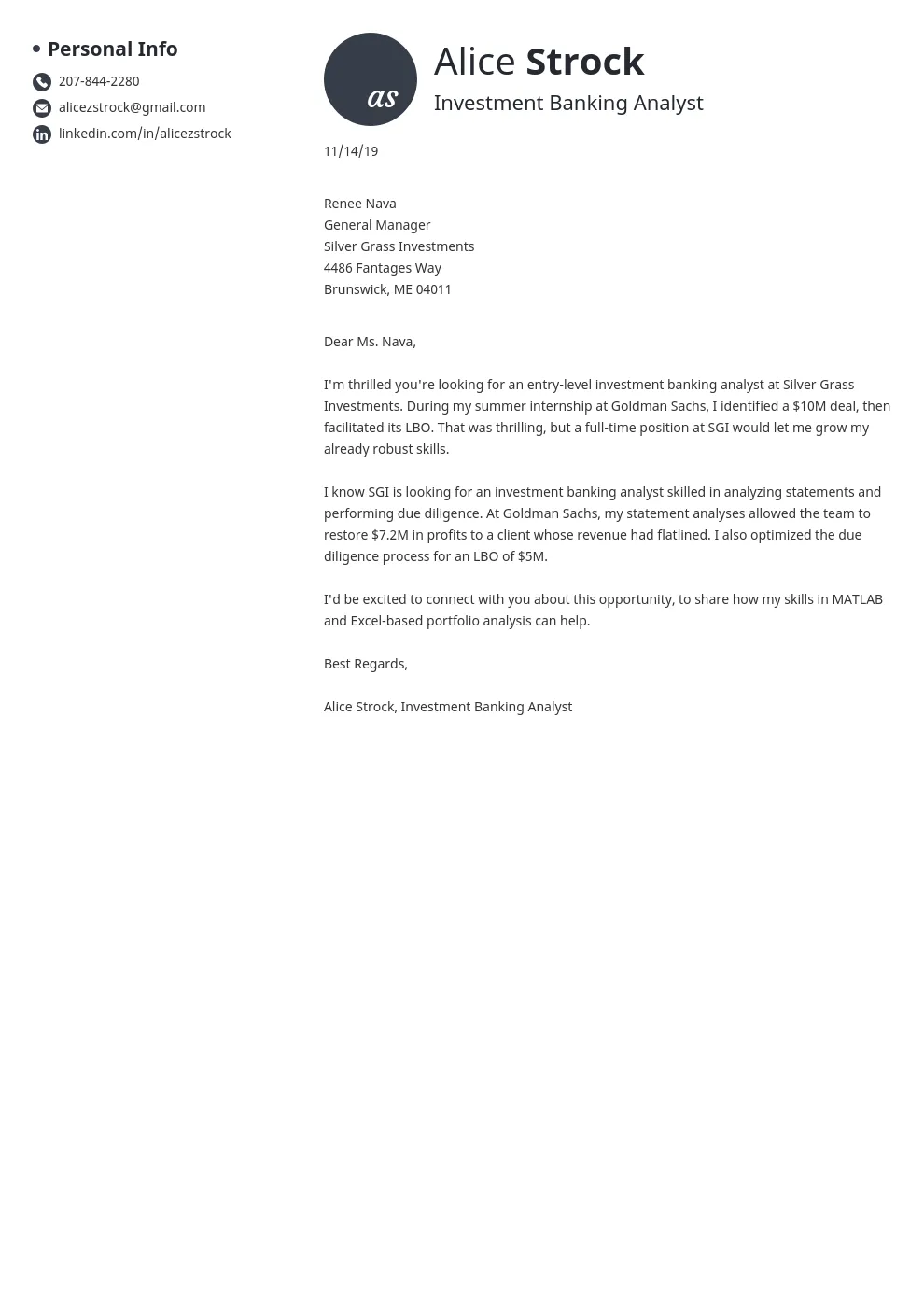
Before submitting your cover letter, seek feedback from career advisors, mentors, or friends. Ask for their honest opinions on your writing style, the clarity of your message, and whether your letter effectively conveys your qualifications and enthusiasm. Incorporate their feedback, and refine your cover letter until it is polished and impactful.
